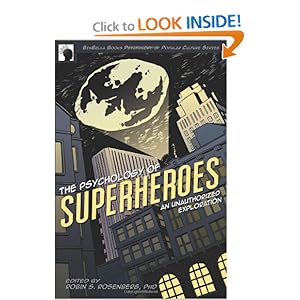 This is a cool topic - and it sounds like an interesting book. The Psychology of Superheroes: An Unauthorized Exploration (Psychology of Popular Culture series), Robin Rosenberg PhD (Editor) - 18 essays on the psychology of idealized men and masculinity (mostly - there is Wonder Woman and female mutants in X-Men), or conversely, the dark masculinity of villains.
This is a cool topic - and it sounds like an interesting book. The Psychology of Superheroes: An Unauthorized Exploration (Psychology of Popular Culture series), Robin Rosenberg PhD (Editor) - 18 essays on the psychology of idealized men and masculinity (mostly - there is Wonder Woman and female mutants in X-Men), or conversely, the dark masculinity of villains.The Secret Lives of Men
Unmasking superhuman abilities and double lives, this analysis showcases nearly two dozen psychologists as their essays explore the minds of pop culture’s most intriguing and daring superheroes, including Spider-Man, Batman, Superman, and the X-Men. Exposing the inner thoughts that these reclusive heroes would only dare share with trained professionals, heady experts give detailed psychoanalyses of what makes specific superheroes tick while answering such questions as Why do superheroes choose to be superheroes? Why is there so much prejudice against the X-Men mutants? What makes Spider-Man so altruistic? and Why are supervillains so aggressive? Additionally, the essays tackle why superheroes have such an enduring effect on American culture.Listen or download:
Listen to internet radio with Secret Lives of Men on Blog Talk Radio
This is a very useful review of the book by Malvin, a reviewer on the Amazon page - he offers some insight into what we get with this book.
"The Psychology of Superheroes" by Robin S. Rosenberg (editor) is an outstanding collection of eighteen essays about the insights we can gain in human psychology by studying the behavior of comic book superheroes. Almost all of the authors are college professors or doctoral candidates in psychology who expertly blend their professional knowledge with their love of comics. The result is a clever, witty and intriguing book that should appeal to anyone interested in psychology or pop culture.
Several authors dedicate their essays to studying how individual superheroes fit or deviate from standard psychological models and practices. For example, Christopher Patrick and Sarah Patrick contend that the Incredible Hulk suffers from a textbook example of reactive aggression triggered by the extreme physical and emotional maltreatment he suffered as a youth. Robert Biswas-Diener finds that the Spider-Man alter ego allows Peter Parker to gain encouragement through performance and an increase in personal happiness in general accordance with positive psychology theory. On the other hand, Bradley Daniels informs us that the insanity plea seems to be used far more frequently in the comics than in real life; and thankfully, no real world mental institution exists that is as easily escapable as Gotham's notorious Arkham Asylum.
The moral behavior of superheroes is discussed in several pieces. Peter DeScioli and Robert Kurzban compare and contrast the absolutist ethics of Superman with the more complex utilitarian ethics of Batman, who nonetheless retains a consistent sense of purpose to ensure socially just outcomes. Andrew Getzfeld suggests that The Punisher's moral outrage over the murder of his family compels him to engage in an extreme form of vigilantism that, unfortunately, would probably remain intractable even if he was afforded the benefit of intensive clinical treatment.
Other articles shed light on the psychology of groups, institutions and society. Mikhail Lyubansky shows how the X-Men embody the ideology of tolerance and diversity within the walls of the Xavier Institute but are unfairly scapegoated for their enviable talents by human society. Chuck Tate studies the history of Wonder Woman to discuss how changing societal attitudes towards women has made the struggle to depict a strong, independent woman to remain a highly problematic task.
These are just a few of the many remarkable essays contained in this fun, intelligent book. It is highly recommended to everyone.
Tags:

No comments:
Post a Comment